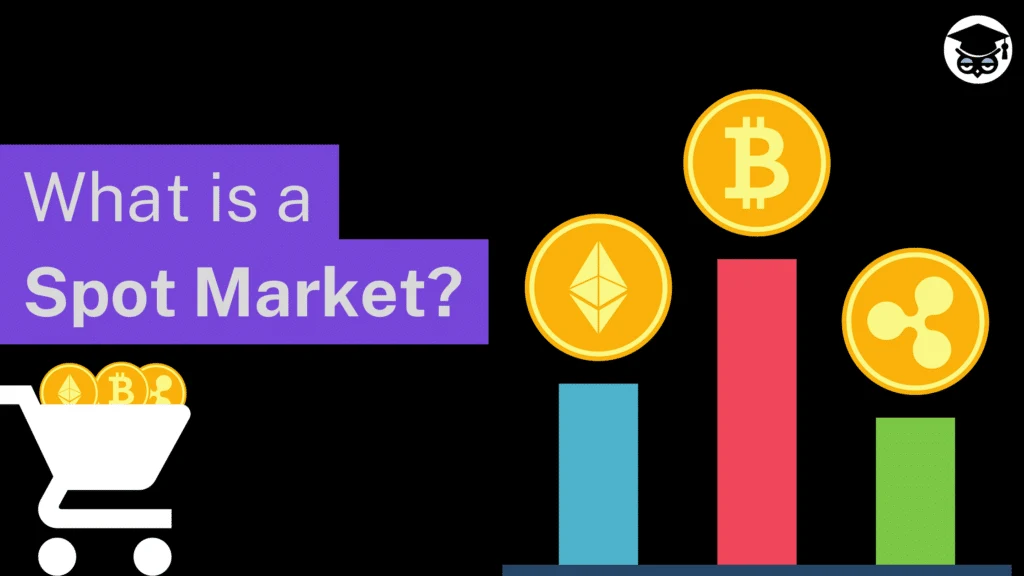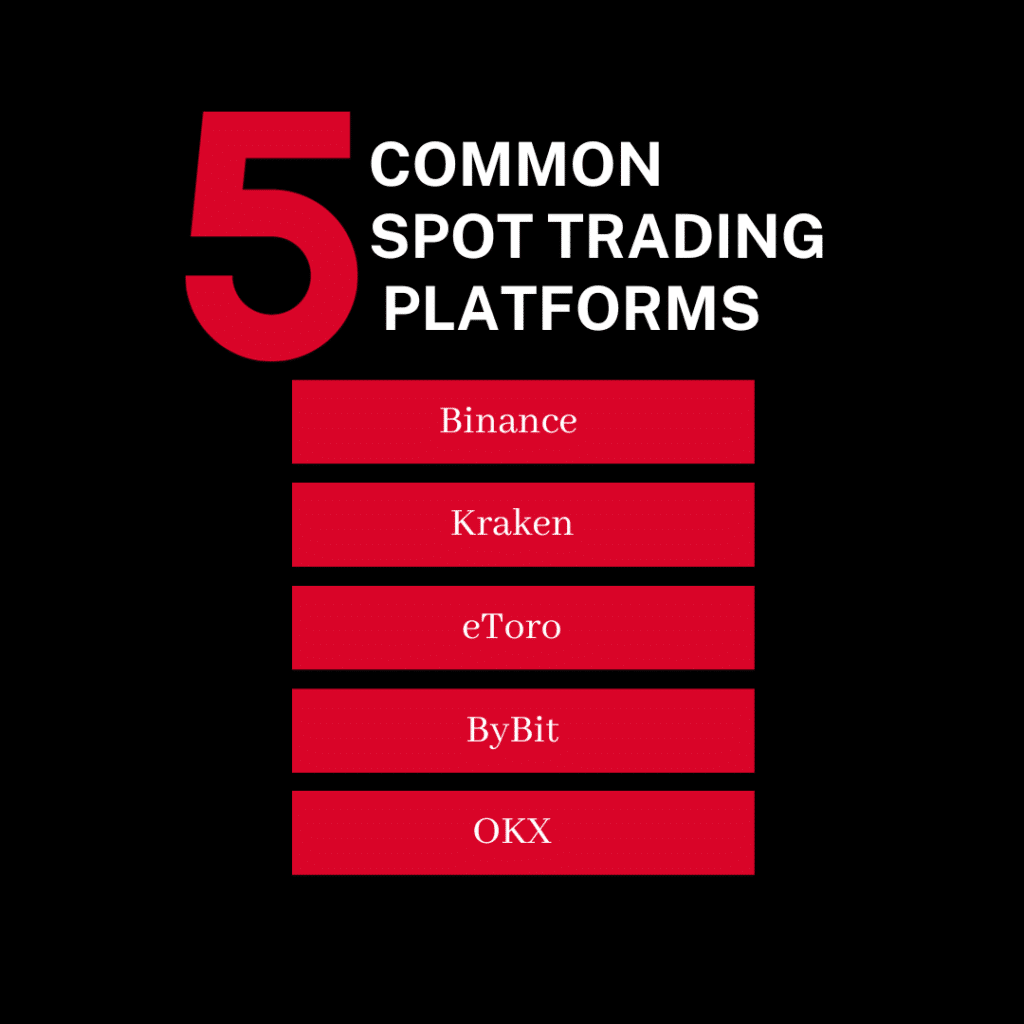What is a Spot Market?
A spot market is a marketplace where cryptocurrencies are traded immediately at the prevailing market prices.
The Long Definition
A spot market is a marketplace where assets are traded immediately (on the spot) at current prices. Imagine someone going to buy cryptocurrencies. In a spot market, once they complete the payment, they will receive the assets immediately or within a short time.
There are spot markets for all kinds of assets. In crypto, spot trading occurs primarily in exchanges. These can be centralized exchanges (CEXs) or decentralized exchanges (DEXs). You can also trade directly with other crypto users in over-the-counter (OTC) trades, although this method is relatively uncommon.

Understanding Spot Markets
A spot market is any market where assets are bought or sold with immediate delivery. Let’s say you want to buy one Ether (ETH).
If you receive the ETH in your wallet within a short period after paying, the market you traded on is a spot market. The trade was executed more or less ‘on the spot,’ hence the name.
This is the opposite of a futures market. In a futures market, cryptocurrencies are bought and sold for future delivery. You basically agree to buy or sell a specific amount of crypto for a certain price at a future date. The trade will then be executed on the agreed date.
The buyers and sellers of this kind of trade are known as spot traders. The act itself is referred to as spot trading and is done with the goal of returning a profit.
This occurs in two ways. The most common one is buying crypto assets when their prices are low and then selling at a later date when they increase.
The other way involves selling assets and then repurchasing them at a later date when the price decreases. This is known as shorting the market. It is the inverse of conventional trading.
Because the execution of trades is instant, spot market prices are updated in real-time. This means that changes in the price of crypto coins and tokens will be reflected immediately in the market.
Spot Markets in Crypto
Spot trading takes place on various platforms in crypto. Most of these are CEXs or DEXs. A less common alternative is OTC spot markets.
Spot Trading on CEXs
CEXs are trading platforms that are owned and controlled by a central authority. They are also the most widely used spot trading platforms. Here, trading occurs through an order book.
An order book is a ledger that records buy and sell orders. It is maintained by the entity that operates the platform. So, how does it work?

The ledger has two sides. There is a buyer side that has bids. These are orders placed by people looking to buy the asset in question. A bid typically includes the amount of crypto the buyer wants to purchase and the bid price. The bid price is the amount the buyer is willing to pay for the crypto.
Let’s say you want to buy 1 ETH at $2,000. When you place an order, this information will be written in the order book on the buyers’ side.
The other side is the seller’s side. It contains asks. These are orders placed by sellers of the asset. An ask will include the amount of crypto on sale and the asking price. The asking price is the amount a seller is willing to accept for their crypto.
Let’s now say a seller wants to sell 1 ETH at $2,000. When they place an order, this information will be written in the order book on the sellers’ side.
The order book works by executing matching buy and sell orders. These are orders where a buyer’s bid matches that of a seller. In the examples above, the orders will be matched because both you (the buyer) and the seller price 1 ETH at $2000.
Spot Trading on DEXs
Unlike CEXs, DEXs are not controlled by anyone in particular. Ownership over the platform is distributed among the various participants.
So, how does spot trading take place?
There is a tiny minority of DEXs that use the order book model. But generally, in most modern DEXs, the whole affair is governed by smart contracts. A smart contract is an agreement written in code and posted on the blockchain. It is self-executing, i.e., it automatically executes when a particular set of instructions are met.
Smart contracts are the link between traders on a DEX.
But that’s not the only difference between DEXs and CEXs. On a CEX, users can trade fiat for crypto, crypto for fiat, and crypto for crypto. But on DEXs, only the last option is available. You can instantly swap one kind of crypto coin or token for another, but it is impossible to make trades involving fiat currency.

OTC Spot trading
Over-the-counter trading (OTC) takes place outside of exchanges. As a result, it’s sometimes referred to as off-exchange trading.
In OTC trades, crypto is traded without the use of an exchange. There are two ways to go through this. The more outdated method is to arrange a physical meeting. However, OTC trades happen today on platforms like Genesis Global Trading, Coinbase, and FalconX.
Advantages of Spot Markets
A spot market offers several advantages to traders:
- Liquidity: The spot market usually has a large number of buyers and sellers. Therefore, it is characterized by higher liquidity than other markets. Liquidity refers to the availability of funds to trade with.
- Lower fees: Trading fees in the spot market, especially on CEXs, are low. This is thanks to the high liquidity and the fact that trades are executed there and then.
- Price transparency: Prices in the spot market are determined by the prevailing forces of demand and supply. Therefore, they tend to be more fair and transparent than in the futures market. Prices in the future market are derived from a variety of indexes and averages that may or may not be accurate.
- Flexibility: Because trades are executed almost immediately, the spot market allows traders a great deal of flexibility. This is because traders can quickly adjust their positions in response to market conditions.

Disadvantages of Spot Markets
A major disadvantage of spot markets in crypto is volatility. Crypto prices change rapidly in response to market conditions. And since spot markets follow this price in real-time, they tend to be quite volatile.
Are Spot Markets Good for Investing?
Yes. Spot markets remain excellent platforms to buy, sell, and profit from crypto. However, you’ll want to conduct adequate research in order to mitigate the risk posed by the volatility of crypto assets.
